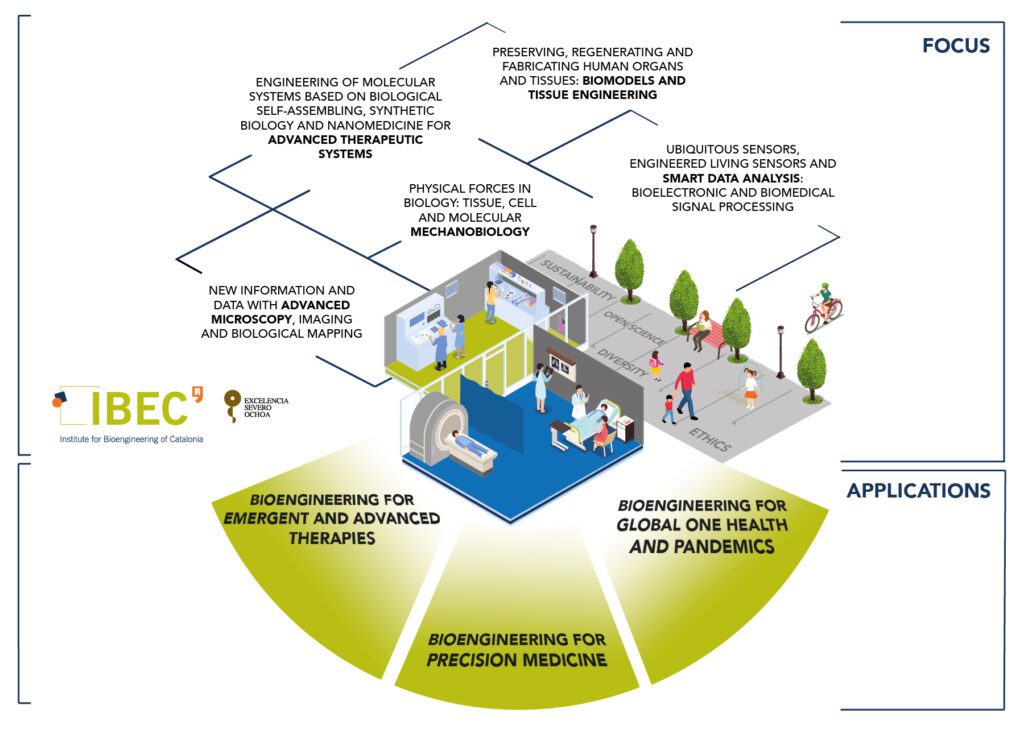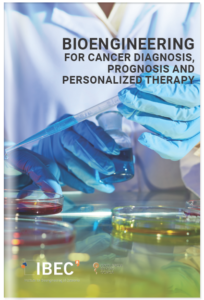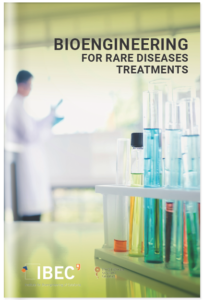Bioengineering means confronting, understanding and solving highly complex problems in biomedicine, bringing together the tools available in the fields of experimental science, life science and engineering in all their facets.
The model envisaged by IBEC is inspired by a creative, innovative new ecosystem based on interaction between research experts in different technologies (nano-bio-info-cogno) to generate new knowledge and engineering solutions in health technology.
The scientific activity of IBEC is structured around three transformative applications that address major research challenges: bioengineering for emergent and advanced therapies, bioengineering for precision medicine, and bioengineering for global one health and pandemics.

BIOENGINEERING FOR EMERGENT AND ADVANCED THERAPIES
Advanced therapies are innovative medical treatments that use cutting-edge technologies to address complex diseases and conditions. They involve manipulating or modifying biological material, such as cells, genes, and tissues, to repair or replace damaged or diseased cells or tissues in the body.
IBEC will develop the following bioengineering tools for the development and production of advanced therapy products:
- Gene Therapies
- Cell Therapies
- Tissue Engineering
BIOENGINEERING FOR PRECISION MEDICINE
Despite the vast amount of omic data available, we still do not know the effects of all possible pathogen variants in human genomes, transcriptomes, and proteomes. For most of these variants it is still unknown which causes disease. These drawbacks hamper the development of advanced diagnostic and prognostic systems and the identification of new therapeutic targets.
On the other hand, the development of new therapies has long been in a cul-de-sac, with success rates below 15% in clinical trials due to lack of efficacy and/or safety, with the associated expense and delay in the commercialization of new drugs. An important part of these low success rates is due to the lack of accurate preclinical disease models that take advantage of the potential of biomimetic systems and biomodels. Only with an integrative approach we will be able to respond to the most important health challenges we face: cancer, age-related diseases (neurodegenerative, chronic, etc.), rare diseases, and emerging zoonotic and infectious diseases.
We will focus on:
- Enhance the data of High-Resolution Genome Variability Atlas Program to predict the effects of most genetic variants in our genomes.
- Develop and offer improved humanized biomodels as well as their digital twins for precision intelligent medicine.
BIOENGINEERING FOR GLOBAL ONE HEALTH AND PANDEMICS
The One Health approach recognizes the link between people, animals, plants and the environment and aims to contribute to a multidisciplinary response. Bioengineering has the power to improve health globally using a one health approach.
To improve health globally we need to develop strategies and solutions that work in diverse settings, including resource-constrained contexts, using engineering diagnostic, treatment, and disease monitoring platforms. Bioengineering can provide new diagnostic and therapeutic solutions to address antimicrobial resistance and infectious disease epidemics and pandemics.




